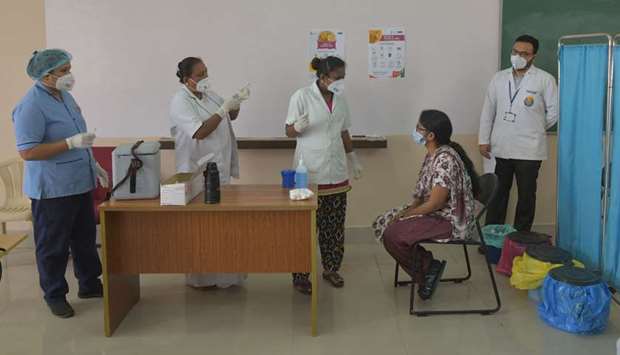India aims to begin vaccinating its 1.3 billion people against coronavirus from Saturday, a colossal and complex task compounded by safety worries, shaky infrastructure and public scepticism.
In one of the world's biggest rollouts, the planet's second-most populous nation hopes to inoculate 300 million people -- equal almost to the entire US population -- by July.
First to get one of two vaccines granted ‘emergency approval’ will be 30 million health and other frontline workers, followed by around 270 million people aged over 50 or deemed high-risk all over the vast nation.
About 150,000 staff in 700 districts have been specially trained, and India has held several national dry runs involving mock transportation of vaccines and dummy injections.
Authorities will use the experience from holding elections in the world's biggest democracy, and from regular child immunisation programmes for polio and tuberculosis.
But in an enormous, impoverished nation with often shoddy transport networks and one of the world's worst-funded healthcare systems, the undertaking is still daunting.
Regular child inoculations are a ‘much smaller game’ and vaccinating against Covid-19 will be ‘deeply challenging’, said Satyajit Rath from the National Institute of Immunology.
The two vaccines approved by India -- AstraZeneca's Covishield, made by local partner the Serum Institute, and Bharat Biotech's Covaxin -- need to be kept refrigerated at all times.
A total of 29,000 cold-chain points, 240 walk-in coolers, 70 walk-in freezers, 45,000 ice-lined refrigerators, 41,000 deep freezers and 300 solar refrigerators are at the ready.
- Bicycle transport -
India has four ‘mega depots’ to take delivery of the vaccines and transport them to state distribution hubs in temperature-controlled vans, but the final leg will be tough.
In one recent exercise in rural Uttar Pradesh -- where summer temperatures exceed 40 degrees Celsius (105 Fahrenheit) -- a health worker was pictured transporting boxes of dummy vials on his bicycle.
In Kashmir, currently being pummelled by snowstorms, databases of priority groups -- and of staff to administer the vaccines -- were still being prepared last week, officials said.
During the last dry run on Friday, workers at one health centre in Bangalore had to use a cellphone hotspot to go online because their network was down.
There are also concerns about the government's aim to manage the entire process digitally via its own app, CoWIN -- of which there are already several fake versions.
As of Monday, it also remained unclear whether the government has yet to agree a price per jab with the Serum Institute.
Tens of millions of shots are reportedly sitting at Serum's factory in the western city of Pune waiting for an agreement before a fleet of refrigerated trucks can take them to the airport.
- Sceptics -
More than 150,000 Indians have died from Covid-19 and the economy is one of the worst-hit worldwide, with millions losing their livelihoods.
‘I look forward to getting the vaccine and living without fear and the mask all the time,’ migrant worker Shatrughan Sharma, 43, told AFP in the capital, New Delhi.
‘The last year was very tough for us.’
But like in other countries, there is scepticism about the vaccine, fuelled by a torrent of misinformation online.
A recent survey of 18,000 people across India found that 69 percent were in no rush to get a Covid-19 shot.
Public trust was not helped by Bharat Biotech's indigenous vaccine being controversially given ‘restricted approval’ without data from Phase 3 human trials.
Plans by Serum to sell the AstraZeneca jab privately to Indian individuals and firms for 1,000 rupees ($14) has also raised fears that the rich will get inoculated sooner.
‘There will be a long wait for poor people like me as the rich and well-off will get it first,’ Suresh Paswan, a rickshaw puller in Patna, in the eastern province of Bihar, told AFP.

